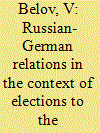| Srl | Item |
| 1 |
ID:
100341


|
|
|
|
|
| Publication |
2010.
|
| Summary/Abstract |
THE PARLIAMENTARY ELECTIONS in Germany* and the subsequent new government coalition put once again on the agenda the future of Russo-German relations. Losing in the elections, vice chancellor Frank-Walter Steinmeier, who developed the partnership for modernization concept, left the new government together with the Social Democrats. ** Remarkably, this concept, which arose from cooperation between Russia and Germany, was proposed as the basic model for developing relations both between Russia and the EU and between Russia and other countries of Europe. The place of the SDP, historically geared to constructive cooperation with Russia, was taken by Free Democrats headed by Guido Westerwelle, who traditionally criticize Russia and its leadership. Observers had some fears about this very politician who filled the position of foreign minister (the impression right at the start of the new coalition's activities was that he could bring discord in relations between Germany and Russia).
The fears proved wrong, however. The new government's statement, unlike the statement of the previous government, had no mention of a strategic nature of the partnership and it sounded more reserved about the objectives and prospects of relations with Russia. This seems to have become even a positive factor because it put an end to needless debates about the meaning of strategic partnership. As a rule, German and European experts had opposing views of this partnership.
|
|
|
|
|
|
|
|
|
|
|
|
|
|
|
|
| 2 |
ID:
125022


|
|
|
|
|
| Publication |
2013.
|
| Summary/Abstract |
IN 2013, special attention is focused on the state and prospects of the whole complex of relations between Russia and Germany: parliamentary elections in Germany, scheduled for September 22, 2013, will usher in a new four-year period of our cooperation. Naturally, such a division into periods is formal and is associated with a possible change of government in Germany. It is very likely that the upcoming elections will result in a new government, which will determine the main parameters of Germany's foreign policy, including its policy towards Russia.
|
|
|
|
|
|
|
|
|
|
|
|
|
|
|
|